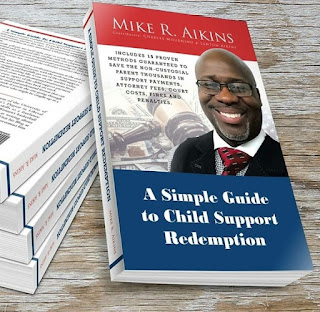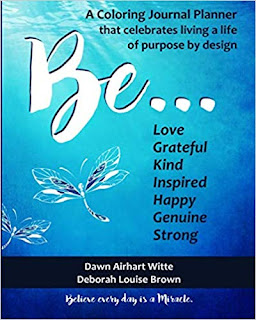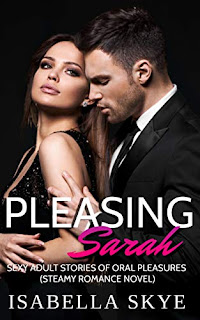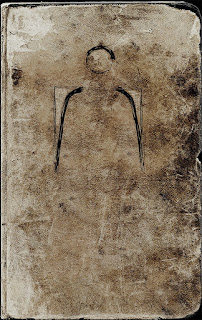Today we are interviewing Mike R. Aikins, author of "A Simple Guide to Child Support Redemption."
Tell us a bit about yourself and your background in the child support payment system.I was tricked into signing up to pay child support for my own children by the very first attorney that I hired to do my divorce. She staged a phony final divorce case hearing and instructed me to “Go downstairs and sign-up for Child Support.” And since I thought an attorney was supposed to do things that were in the best interests of my children and also for me, I didn’t hesitate to sign the paperwork (without reading it carefully) because it was always my intent to take care of the children that I brought into this world regardless of whether or not I was married to their mother..
Describe your book, “A Simple Guide to Child Support Redemption,” for readers unfamiliar with it.
“A Simple Guide to Child Support Redemption” is a self-help guide created for the non-custodial parent going through a divorce. I wrote it to help those parents eliminate the costly mistakes that attorneys don’t even tell them about so that they can get a better understanding of what the child support payment contract that they signed is all about. I start out with the history of how and when the institution of Child Support started. Then, I slowly progress and get into the unwritten rules, fraud, and corruption that most people have to go through when they voluntarily sign-up to pay it.
I explain how Child Support is really a voluntary adhesion contract very similar to a Driver’s License, Social Security Card, Marriage License or Birth Certificate. These are all government adhesion contracts that innocent and ignorant citizens of this country automatically sign and adhere to usually without reading the fine print or getting a clear understanding of what the contract they're signing really means.
What inspired you to take control of your role in the child support payment system? How did what you learned, change your life?
After years and years of going through unfair wage garnishments of my income, going back and forth to Family Court, working with at least ten different attorneys, losing thousands of dollars, being arrested 3 times and losing every job that I had prior to spending that time in jail, I decided that something had to be done and that these agencies needed to be exposed. The fact that they use extremely unfair policies on unsuspecting, innocent tax-paying citizens by putting them into bad financial predicaments, is the reason I took on this extremely tough and thankless mission.
Usually, people go to the Family Court system and then retain a lawyer because they’re trying to get a divorce as quickly and efficiently as possible. They're not expecting to get ripped-off or cheated, and they’re thinking that this is the best and only possible way to obtain a divorce. But more often than not, these State agencies, with support from the Feds, end-up cheating them out of large amounts of their hard-earned money while virtually destroying their lives and finances from that point on with harsh treatment and unfair wage garnishments. But the saddest part about this entire process is that the money they garnish from the non-custodial parent’s paycheck usually doesn’t even make it back into the hands of his/her children.
The system has reached an all-time exploitation level high now because State and Federal agencies are only concerned with how much of a profit they can make. They do this so that they can keep the dollar-for-dollar grant money coming in from the Feds. Federal agencies end-up matching every dollar that these State agencies collect from the non-custodial parents causing an extreme “conflict of interest.” The saddest part about it is that the primary intent of these agencies is to manipulate and financially ruin the non-custodial parent’s life so that he falls behind and gets into arrears on his/her child support payments. At the other end of the spectrum, this evil and unjust way of doing things actually provides job security for the Call Center workers and other employees of the Child Support Enforcement Agencies all the way down from the Court Clerk to the Sherriff and Bailiff as they remain gainfully employed by the Family Court System.
Who do you think would most benefit from reading this book?
The non-custodial parent will benefit the most because they go into these types of situations against the Family Court System with blinders on thinking that they’re going to be treated fair and square, but little do they know, the exact opposite is about to happen. If they read my book and learn as much as they can about the system, they’ll save a ton of money.
What inspired you to write a book about child support redemption?
I was inspired because, throughout my journey, I saw so many people being hurt, being rendered homeless, being incarcerated, losing their jobs and even committing suicide because they weren’t allowed to see their kids. I felt that I had to do something about it by literally becoming an advocate against all of the fraud and corruption that these agencies hide behind.
What are some of the main issues non-custodial parents face with the child support payment system?
The main problem is that the amount that they are often required to pay to so-call support their own offspring, is far too expensive and the courts do this on purpose to control the narrative and also the financial future of anyone coming to them wanting a divorce. They’ll usually make the non-custodial parent’s child support payment obligation so expensive, that there isn’t anything left over after the wage garnishment to live on. This will usually cause him/her to fall behind, while at the same time being basic job security and equity for anyone working on the enforcement side of collecting the payments.
Your book is packed with resources, documents, and verifiable information. What was your research process like for getting the best information to include in the book?
There is a ton of information at the local libraries as well as the Law Library located at the courthouse. Ironically, I found out very early in my research as it was stated in plain English on the main document that explains the child support system, that this system is not intended to be in the best interests of the non-custodial parent. All of this information is easy to find so the State and Federal enforcement agencies are relying on the fact that most citizens don’t read and will probably never actually read or comprehend it.
One of the main topics in the book is ways to save thousands of dollars in costs associated with paying child support payment. To help people get a general idea of their options, can you tell us some of the topics you cover?
I cover important aspects of working with or without an attorney because this is usually the most expensive cost associated with going through the process. I also cover things that can be done prior to marriage and having kids, which really should be taught in schools and especially prior to obtaining a marriage license. I cover the Temporary Orders Hearing process and how to go in there prepared for it and also how to use the proper etiquette in Family Court. However, the most important thing that I stress is how keeping a cool head in these extremely tough situations and predicaments can save the non-custodial parent thousands of dollars over the 18-23 year period of making child support payments.
A strength of the book is that it goes into ongoing legislation to keep readers current. What are some recent changes in child support law?
Joint-custody and joint-parenting is really the only way to go when it comes down to Child Support. Most of the current systems stress Sole Custody because this is how the enforcement agencies end-up holding the non-custodial parent primarily responsible for 100% of a child’s well-being after a divorce. This is the crux of the vast corruption related to the Child Support payment system today. Illinois recently distinguished itself from every other State by adopting policies that allow joint-custody and this was a huge milestone in the plight of former non-custodial parents living in that State. Hopefully, other States like Texas (the infamous leader in Child Support collections) will follow suit.
Another topic you cover is the controversial issues pertaining to Title IV-A and D of the Social Security Act. Can you elaborate on some of these issues?
Title IV-D of the Social Security Act is the contract that Child Support is based upon. It gives employers exclusive rights to garnish wages and also gives the Child Support Enforcement Agencies the power to meddle into a tax-paying citizen’s finances. Title IV-A is simple the Welfare-like services that the CSEA use to manipulate and exploit the financial situation of both the custodial mother and non-custodial father. The States do a great job of separating both of these entities to the point that everyone thinks it’s a simple matter of the CSEA collecting child support from the non-custodial parent and then giving it back to the custodial parent, but this is not how it’s done.
In most cases, the money that comes from the wage garnishments of the non-custodial father is going right to the State, whereas, when the custodial mother signs up to receive TANF (welfare-like) assistance, those funds are funneled and distributed through Title IV-A. This is how the CSEA controls the financial narrative and future of even the sharpest money managers going through a divorce. People going in with good intentions of just wanting to continue paying for their children’s support after a divorce, end-up falling down a treacherous rabbit hole and into the conundrum that is Title IV-A and D of the Social Security Act.
Outside of your book, are there any other resources that are helpful for people struggling with the child support system?
Most States are geniuses at manipulating this system because most people that are struggling through it don’t know whether the laws being enforced are coming from their State or whether they’re coming from the Feds. The State is really in control of this system, but they get really great support from the Feds. In fact, the Feds lets each State write and enforce their own rules pertaining to Child Support. Usually, a government agency like the State Attorney General is really supposed to be there to help the tax-paying citizen in these and other types of financial matters, but when it comes down to all the money that they can make from collecting past due child support payments, they turn against the citizens and go for the enormous profits that they stand to make.
Texas is the leader in Child Support collections and their Attorney General is all-in with them enforcing it and putting citizens in jail when they can’t pay the unfair and unjust child support amounts. So to answer your question, it would behoove anyone struggling with Child Support, to use the well-documented self-help approach and strategies listed in my book. They would also need to understand that no attorney is going to help them because, ironically, that’s not their job because their loyalty is to the Bar Association and the Courts. Finally, to sum it all up, their constitutional rights are not going to be given to them automatically. Constitutional rights were originally written to let people know that these are the rights that they are allowed to have, but inevitably, they might have to engage in a legal battle to actually obtain them.
One of the highlights of your book is the writing style. You take complicated topics and distill them into a digestible, easy-to-read guide. What is your writing process like?
I’m more of a free-lancer and blog-style writer. I started out writing about sports and easy topics like that before I progressed into the tough stuff like Child Support. However, nonfiction genre such as this requires someone that has actually gone through it, to be able to break it down into lament terms so that the average person can understand it. Lots of research is required to cite references and give a book the credibility it deserves.
In your book, you include documented testimonies from people that have struggled through the child support payment system. What are some of the issues their testimonies cover?
It’s hard to believe but it’s obvious now that many people are being rendered homeless, they're losing their families, they’re being alienated from their children, and they’re also losing their jobs based on having to go through the current Child Support payment scam.
If you had one piece of advice for someone looking to take control of their child support situation, what would recommend?
People need to do their research and become a student of the game. Government agencies love the fact that most people don’t read their contracts or read the fine print until it’s much too late. Before getting married, seek a second opinion and do your research on all sides of the issues like pre-nuptials and other pre-marriage agreements. You really need to be cognizant of the repercussions that will happen if you obtain a marriage license, get married, and have kids, and then end up getting a divorce. The best possible advice is to always stay cool and don’t get into any arguments with your ex because this will extremely exacerbate the situation and cost thousands of dollars when it’s all said and done.
What was the most interesting thing you uncovered while doing research for the book?
That the entire Child Support system is based on a voluntary contract that’s signed by an unsuspecting non-custodial parent. Little do they know what they are about to go through when they sign-up to pay it. Most want to take care of their children and will keep working and finding jobs in order to do it. However, the CSEA primary objective is to take a good situation and turn it into a bad financial predicament so that they can make a huge profit off the backs of innocent people that love their children.
Did writing the book take you to unexpected places or reveal things you hadn’t thought about before?
I took it to the Supreme Court thinking that they would treat me fair and with justice. But, I found out that they are in on it with the State and Federal governments and that I didn’t have a leg to stand on without researching and finding out what the laws were all about on my own. The Supreme Court dismissed my case without prejudice citing the Rooker-Felman Doctrine which simply means that they won’t come back in and intervene in a court case where someone is claiming they were injured by a decision or judgment from their State. This was simply a ploy and 100% evidence that proves they are in on it with the State and the only way to get around it is through self-help techniques that are offered in my book.
What was the most challenging aspect of writing the book?
The most challenging aspect was keeping it professional and not making it a racial issue. When people read my book, they’ll find out that I never once mentioned in the entire book that anything that was done to me was racial. The fact of the matter is; Child Support has everything to do with “class” issues like rich vs. poor, the haves vs. the have-nots, and only a small portion of it has anything to do with race. The only part that really has to do with race is the total amounts of different people of all races that are forced to go through it.
What do you hope readers will gain from reading your book?
I want to keep people from getting ripped off by an evil, deceptive and thankless system where the judges are not real and the system is rigged in order to make a profit.
How have readers responded to your book so far?
I’ve sold a few on Amazon but I’m in the process of really marketing it and getting it out there to the masses. Once I record my Audible version, I think it will sell more as well. I’m hoping an educator, rich investor or Hollywood producer will purchase a lot of copies, teach it as curriculum, or even turn my manuscript into another movie on the big screen like Divorce Corp.
What do you have in mind for your next writing project?
I’m going to tackle the subject of the At-will Employment Contract to help people understand the nuances of signing a contract to work in Corporate America.
Is there anything else you'd like potential readers to know about your book?
My book is being offered and sold worldwide because many other countries have the same policies as the States for a Child Support system that’s used to manipulate and exploit people and their children to make a profit.
More Information
Buy the paperback version on Amazon.
Buy the Kindle version of the book.
Visit the author's WordPress blog.
Check out the author's Youtube channel.
Like the author on Instagram.
Check out the author on LinkedIn.












